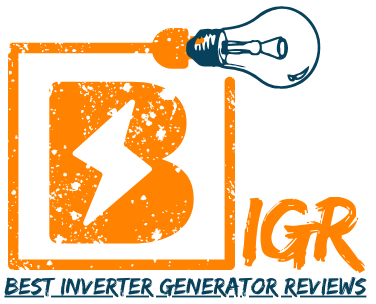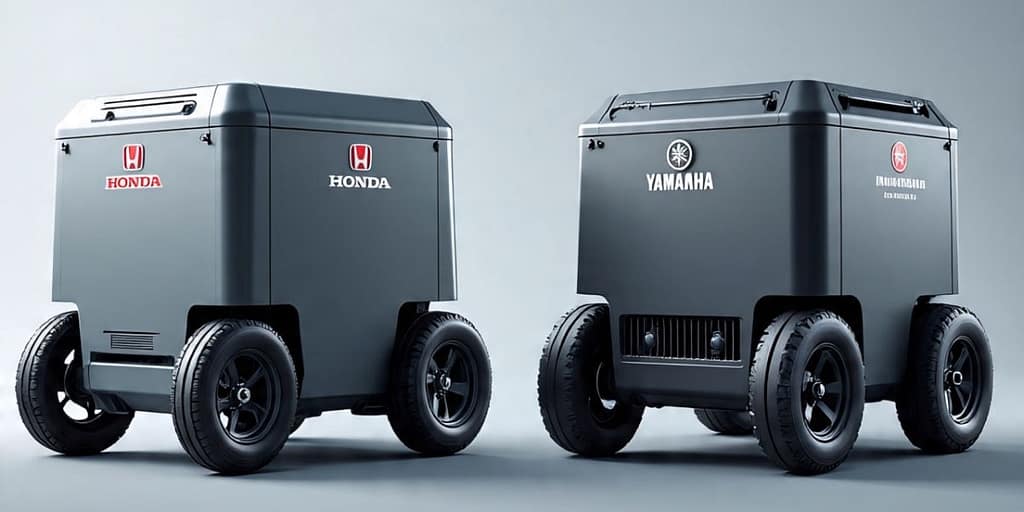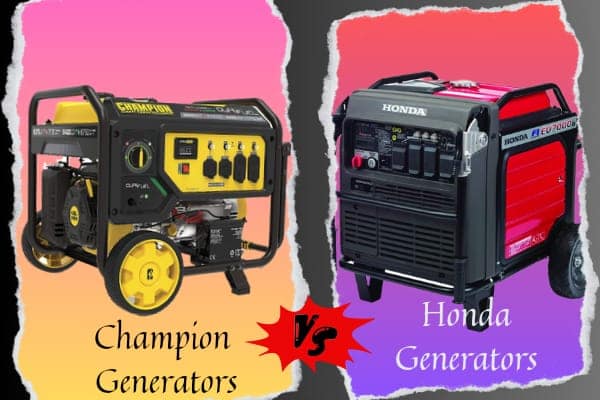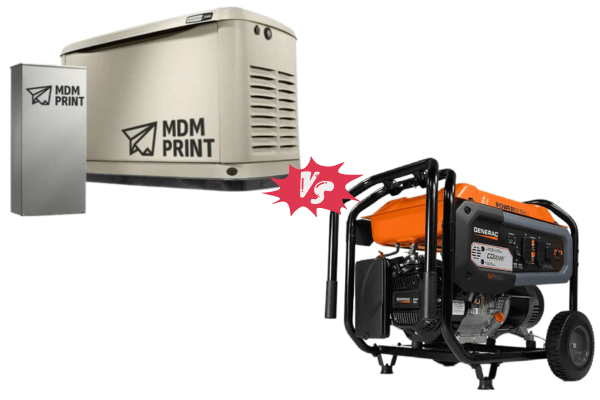
Have you ever found yourself in the middle of a blackout, desperately wishing you had a backup generator to keep the lights on? As natural disasters and power outages become more common, it’s crucial we have reliable sources of emergency power. But with both solar and gas generators readily available, which type is the better bet?
In this article, we’ll objectively examine both solar and gas generators to compare their real-world functionality, long-term costs, environmental impacts, and overall user experience. By exploring all relevant factors, I hope we can determine which technology provides the most reliable backup power solution for the modern age. Because in times of crisis, green energy or gasoline, we all want what gives us reliable access to necessities like heat, refrigeration, and critical medical devices.
So, let’s see which portable powerhouse emerges as the clear 21st-century backup champion. You’ll be surprised at what the data reveals!
Solar generator vs Gasoline Generator: Which one is more Beneficial?
1. Environmental Impact
I’ve been thinking about getting a backup generator for my home lately. Living out in the country, power outages are common whenever lousy weather rolls through. But with so many options on the market these days, I was wondering which type of generator would be the best choice, both environmentally and financially.
When I first started looking into it, solar generators piqued my interest. The idea of being able to power some essentials in my house without relying on gas is pretty appealing. Plus, using energy directly from the sun feels way more sustainable than burning fossil fuels.
After doing some research into the pros and cons of solar versus gas generators, solar is the cleaner, greener option. For one, it doesn’t produce emissions or pollution when it’s generating power—no carbon dioxide, nitrogen oxides, or other nasty stuff being pumped into the air. As someone who enjoys hiking and being outdoors, keeping the air and water sources near my home as pristine as possible is essential.
On the flip side, gas generators could be better for the environment. When you burn gas to produce energy, all those emissions increase over time. And we all know climate change is a serious issue. If more of us switch to renewable energy sources like solar, it could really make a difference in reducing our carbon footprint as a society.
Another downside to gas generators is the risk of leaks and spills. Even responsible users can accidentally spill fuel on the ground during refueling. Once it gets into the soil or a nearby stream, that pollution is challenging to clean up. At least with solar, I wouldn’t have to worry about mishandling toxic chemicals.
The choice is clear-cut when you factor in the environmental costs of gas generators versus the many benefits of solar power. Solar power is cleaner and safer for the planet and my community. It may cost more upfront, but it will save me money in the long run and do less environmental damage. For my home backup needs, solar definitely seems like the generator of the future.
2. Cost-effectiveness
When I started looking into getting a backup generator, the cost was definitely a major factor I had to consider. This is a big purchase, after all, so I wanted to make sure I was getting the best bang for my buck option.
At first glance, gas generators seemed way more affordable upfront. You can find a decent gas model for just a few hundred bucks. But were the long-term savings of solar really worth the higher initial investment?
I broke out the calculator to get a better idea of the true costs over time. While solar systems are more expensive to buy, you’re only sometimes paying fuel bills month after month. Maintenance, like replacing parts or doing an oil change, isn’t an issue with solar.
Just thinking about how much I’d spend every time I needed to fill a gas tank started to add up quickly. Fuel costs have risen so much lately, too, that it’s hard to predict what I’d be paying years down the road. At least with solar, the sun is a reliable energy source that won’t change prices on me.
Whenever I’ve had to maintain appliances or vehicles before, unexpected repair bills have a way of sneaking up on me. Solar generators are much simpler systems that require little ongoing care. That lack of maintenance costs is really appealing.
When you consider the lifetime cost of ownership, solar pays for itself within 5-10 years for most people. After that, it’s all savings. That’s a very reasonable timeframe in my book, especially when energy independence is the end goal.
For something I hope to rely on for many years providing backup power, solar is absolutely the most cost-effective solution for me and my home. The upfront investment might be steeper, but it’s totally worth it if I can avoid fuel and repair bills down the road.
3. Convenience and Portability
Regarding portable power on the go, solar generators and gasoline-powered units each have pros and cons. As someone who enjoys camping and being outdoors, I’ve had some experience with both types.
Solar generators have a great benefit in their lightweight design – they’re much easier to lug around than gas models. No heavy lifting or bulky equipment to haul. Just throw it in your car or backpack, and you’re good to go. They’re also reticent, perfect if you need power for small electronics inside a tent or cabin—no disturbing noises to wake you at night. You can see following models are reviewed in recently:
- Jackery Explorer 300
- VTOMAN Jump 1000 Watt Solar Generator
- Bluetti EB3A
- Westinghouse jgen300s
- Bluetti Solar Generators
On the downside, solar is at the mercy of Mother Nature. On cloudy days or if it’s overnight, you won’t get much juice flowing. The panels also take up more space than a portable gas unit. But overall, the convenience of solar’s silent, mobile operation makes it my top choice for low-power needs in outdoor recreation.
Gas generators provide a more heavy-duty source that kicks on anytime, rain or shine. No worrying about charging batteries in the sunlight. They can power larger appliances like fridges with no problem. But man, are they loud! I’d only use one if camping way off the grid where noise wasn’t an issue. The gas and fumes also limit the use of them indoors. And refueling is a hassle compared to charging solar panels.
So, my little solar panel does the trick perfectly for one-person camping trips where I only need to power small gadgets. But the reliable gasoline model wins out for group outings with bigger power hunger, even if it is a pain to haul around. I hope this real-world perspective helps you decide which portable power source fits your needs best!
4. Energy Independence
Living off the grid and being self-sufficient has always appealed to me. I love the idea of not relying on unpredictable things like power outages or the availability of gasoline during emergencies. That’s why I was so interested in solar generators as an option for my backyard cabin.
Don’t get me wrong, gasoline generators have their place. We’ve used one on our family camping trips for years now to power small appliances. But having to find gas if the power goes out long-term doesn’t sit right with me. What if the gas stations are empty after a big storm? Not to mention that constant refueling gets old fast.
When I first heard about solar generators, I was skeptical. How much power could they really provide? After doing some research, I was impressed. These things can power all the essentials like lights, phone chargers, and even a small refrigerator. The best part is that the sun is a renewable resource practically everywhere. As long as it’s shining, you’ll have juice.
No more worrying if I’ll be able to get fuel or if the power company will have things fixed in a timely manner. With solar, I’m empowered to take care of my own energy needs. The upfront investment may be more than a gas generator, but I think it will pay off in the long run with zero fuel costs and true energy independence. Peace of mind is of high value, too.
I’m looking forward to installing a system this fall and finally cutting those power company cords for good. No more being at the mercy of outside forces – how’s that for freedom?
5. Scalability and Expandability
When we first moved into our home, the solar panel system I installed was basic – just enough to run some lights, phones, and a small fridge during outages. But I knew from the start that our energy needs would grow as our family did.
That’s one of the best things about solar – it’s totally scalable. If you start with a modest setup, adding more panels or batteries later on is no problem. Modular systems make expansion simple. All I had to do was purchase a few extra components to boost my capacity over the years.
Compare that to gasoline generators, which give you a fixed amount of power forever. If your family of four becomes six, too bad – you’re stuck with that original generator’s limits. Upgrading means buying an entirely new machine, which gets expensive quickly.
Thanks to the flexibility of my solar system, I’ve been able to keep pace with our increasing electricity usage reliably. As the kids got older and needed more outlets for devices, I responded by installing a few more solar panels on the roof. No sweat.
If I decide to add an electric vehicle or other significant loads, my solar platform can scale to the task. That kind of future-proofing gives me real peace of mind. Solar grows right alongside my home and energy lifestyle without continual investments. Now, that’s a renewable resource I can really depend on for decades to come!
6. Noise Pollution
When we decided to upgrade our backup power system, one of our biggest priorities was finding a solution that wouldn’t disturb the neighborhood. Our old gas generator was just too darn loud! Every time the power flickered out, we’d crank it up and instantly have a chorus of complaints from the neighbors. I couldn’t really blame them – that thing was obnoxious.
It wasn’t just annoying for others, though; the noise bothered me, too. I have a hard enough time sleeping as it is without having an engine roaring away outside my bedroom window. And don’t even get me started on trying to relax out on the patio during an outage! I might be standing next to a race car.
When a friend suggested I check out solar generators, I was skeptical at first. I figured anything called a “generator” had to make some sort of racket, right? However, after doing some research, I was shocked to discover these things operate completely silently. No churning motor or popping exhaust – just clean, quiet power. As someone who values peace, that sold me right away.
We ordered a top-of-the-line solar generator that could power all the essentials like our fridge, WiFi, and a few lights during an outage. On its first real test during a week-long blackout last month, it performed flawlessly without a peep of noise. No more disturbed neighbors and no more disturbed sleep for me. Best of all, I know we’re using an eco-friendly power source that won’t pollute the air or annoy anyone with its operation.
I can’t recommend solar generators enough for anyone else who wants reliable backup power without noise pollution. Do your community a favor and look into going solar for your next generator. You’ll be glad you did!
7. Maintenance and Reliability
Maintenance is a real concern when you rely on a generator as your backup power source. The last thing you want is for the thing to break down just when you need it most during a storm. That’s one of the big advantages I’ve noticed with my solar generator compared to the old gas one.
That gas generator was a maintenance nightmare. Every few months, I was fiddling with it, changing the oil, swapping out filters, or monkeying around with some other part. And forget about actually using it – by the time a repair was done, the power was usually back on anyway.
Don’t even get me started on the hassle of storing fuel for it long-term and keeping it fresh. What a pain to deal with inventorying fuel, stabilizing it, and then struggling to get it started when the power went out. All that fuss, and it still broke down on me twice when I really needed backup power.
In contrast, my solar generator has been a total dream. Aside from occasionally wiping down the panels, there’s basically zero maintenance required. No oil changes, filter replacements, or any other part that could fail. It’s as simple and reliable as the sun itself.
Even better, since there are fewer components to break or wear out, I expect this solar generator to last way longer than any gas one I’ve owned in the past. The peace of mind from such low maintenance is priceless, especially when you’re counting on backup power in emergencies. I’ll take simplicity and reliability over constant upkeep any day.
Final Verdict
Solar takes the prize when weighing all the pros and cons between solar and gas portable backup generators. It provides reliable power in a sustainable, non-polluting package. Solar sets the new standard for supplemental off-grid electricity for most homeowners or small businesses.




